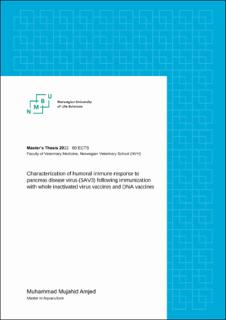Characterization of humoral immune response to pancreas disease virus (SAV-3) following immunization with whole inactivated virus vaccines and DNA vaccines
Master thesis
Permanent lenke
https://hdl.handle.net/11250/3066232Utgivelsesdato
2022Metadata
Vis full innførselSamlinger
Sammendrag
ABSTRACT
Salmonid alphavirus type-3 (SAV-3) is the causative agent of pancreas disease (PD) in Atlantic salmon. It is associated with significant economic losses to the aquaculture industry. Vaccines can overcome losses through vaccination. In this study, anti-SAV-3 antibodies in plasma samples from Atlantic salmon vaccinated with DNA, inactivated whole virus vaccines (IWV) and combined delivery of were quantified through indirect enzyme-linked immunosorbent assay (ELISA). Plasma samples at 1:50 dilution was found to have neutralizing antibodies using 100 TCID50 SAV-3, but additional testing showed no neutralization at 1:20, 1:40, 1:80, and 1:160 dilution of plasma samples tested on both chinook salmon embryo (CHSE-214) and chum salmon heart (CHH-1) cell lines. At 1:20 dilution, cytotoxicity was observed in CHSE-214 and CHH-1 cell lines. Furthermore, there was no significant effect of complement on neutralization, although a tendency towards delayed CPE was observed. In summary, immunization of Atlantic salmon with plasmid-encoded (DNA), inactivated whole virus vaccines or combined delivery of intraperitoneal and intranasal induced low levels of circulating antibodies tested by ELISA. Classical virus neutralization assays gave very low to no neutralizing titer. However, employing an indirect fluorescent antibody test (IFAT), titers were found to be 40-80 with some variation between vaccines while for some fish in the DNA vaccinated group, above 80 (no endpoint dilution obtained). It is concluded that an ELISA and IFAT-based neutralization assay can be combined to estimate and document the presence of anti-SAV-3 antibodies post vaccination but correlation with protection against disease is not known.
Keywords: Atlantic salmon, SAV-3, CHSE-214, CHH-1, Indirect ELISA, Neutralization, Antibody, Complement, Dilutions, TCID50, Vaccines ABSTRACT
Salmonid alphavirus type-3 (SAV-3) is the causative agent of pancreas disease (PD) in Atlantic salmon. It is associated with significant economic losses to the aquaculture industry. Vaccines can overcome losses through vaccination. In this study, anti-SAV-3 antibodies in plasma samples from Atlantic salmon vaccinated with DNA, inactivated whole virus vaccines (IWV) and combined delivery of were quantified through indirect enzyme-linked immunosorbent assay (ELISA). Plasma samples at 1:50 dilution was found to have neutralizing antibodies using 100 TCID50 SAV-3, but additional testing showed no neutralization at 1:20, 1:40, 1:80, and 1:160 dilution of plasma samples tested on both chinook salmon embryo (CHSE-214) and chum salmon heart (CHH-1) cell lines. At 1:20 dilution, cytotoxicity was observed in CHSE-214 and CHH-1 cell lines. Furthermore, there was no significant effect of complement on neutralization, although a tendency towards delayed CPE was observed. In summary, immunization of Atlantic salmon with plasmid-encoded (DNA), inactivated whole virus vaccines or combined delivery of intraperitoneal and intranasal induced low levels of circulating antibodies tested by ELISA. Classical virus neutralization assays gave very low to no neutralizing titer. However, employing an indirect fluorescent antibody test (IFAT), titers were found to be 40-80 with some variation between vaccines while for some fish in the DNA vaccinated group, above 80 (no endpoint dilution obtained). It is concluded that an ELISA and IFAT-based neutralization assay can be combined to estimate and document the presence of anti-SAV-3 antibodies post vaccination but correlation with protection against disease is not known.
Keywords: Atlantic salmon, SAV-3, CHSE-214, CHH-1, Indirect ELISA, Neutralization, Antibody, Complement, Dilutions, TCID50, Vaccines
